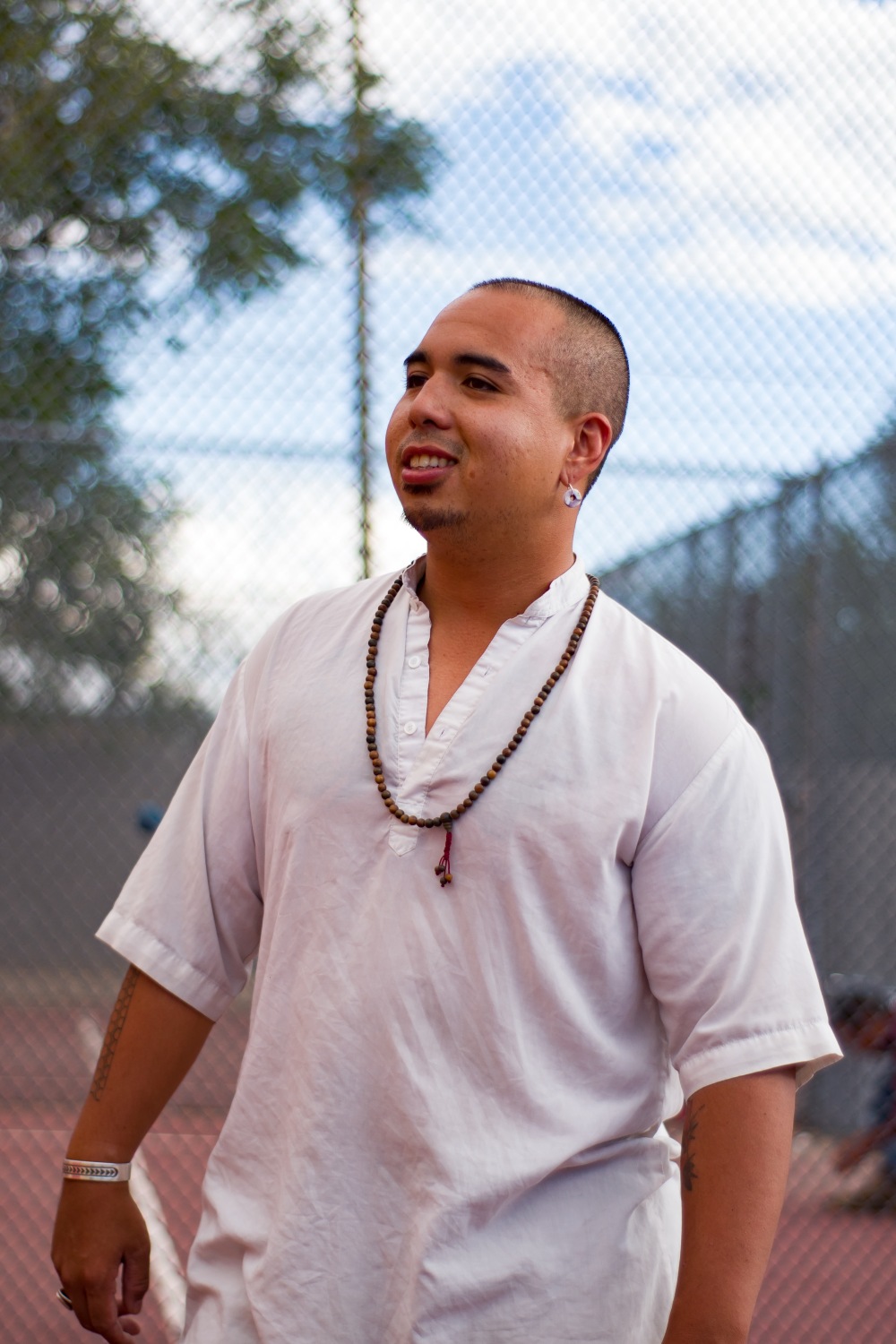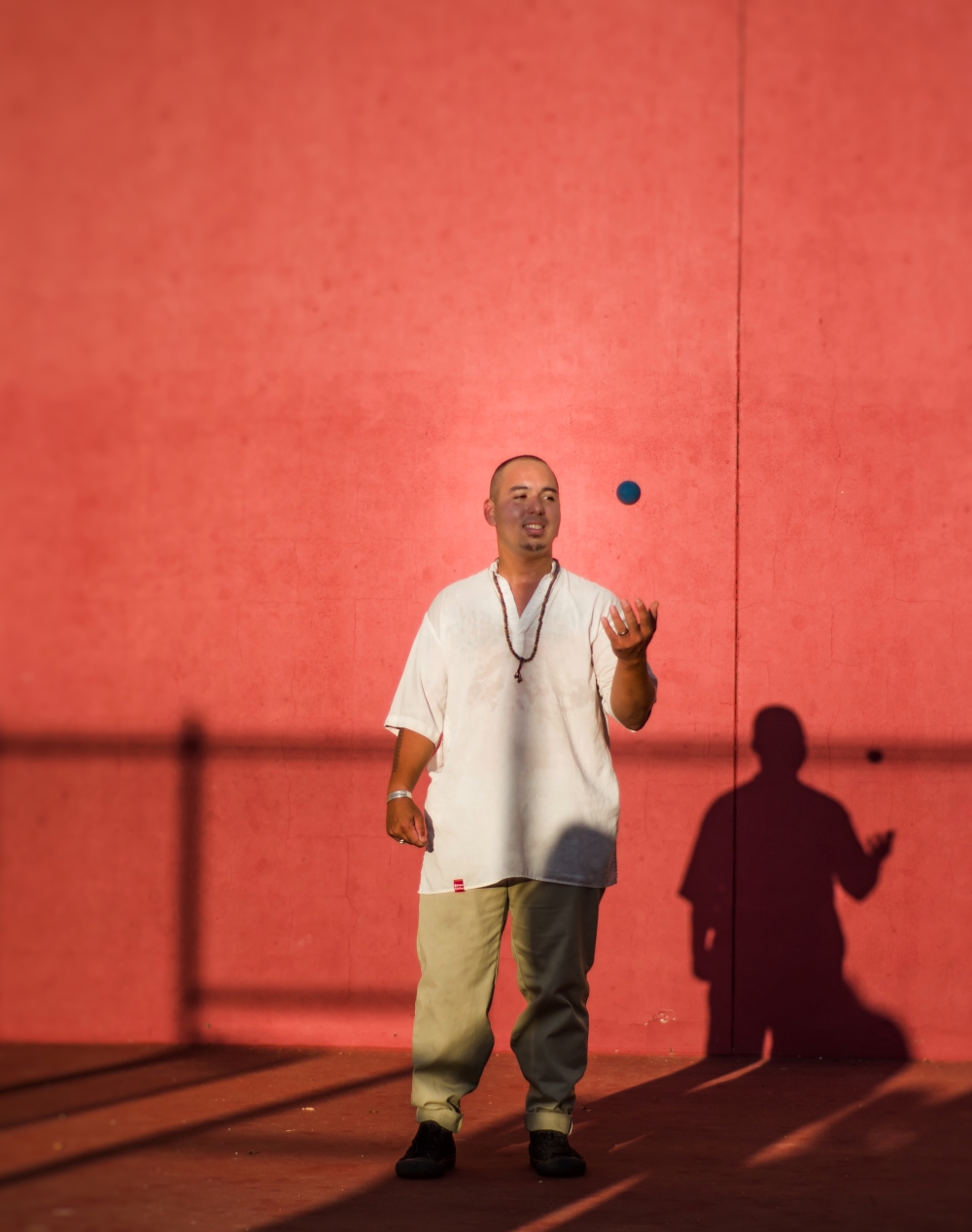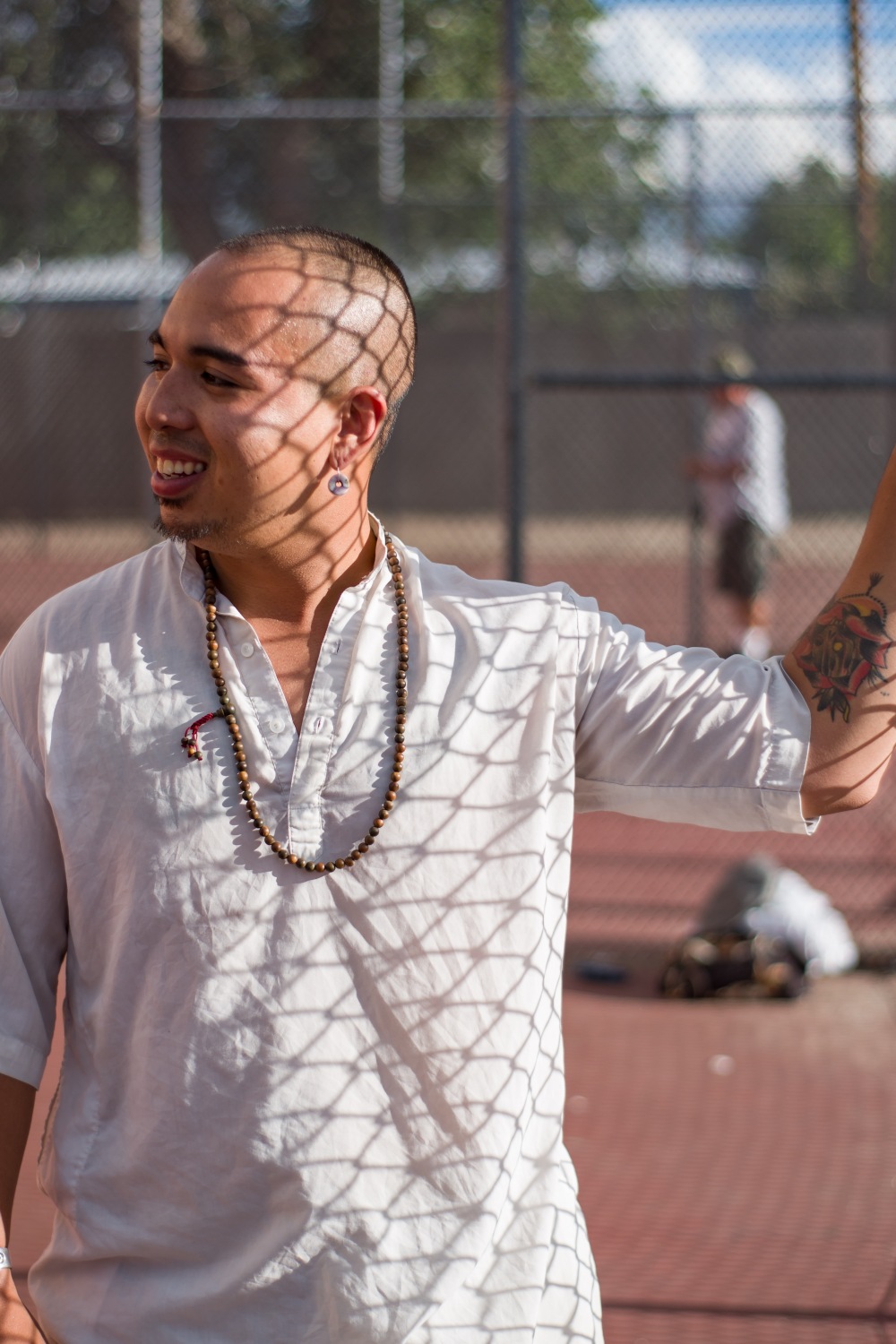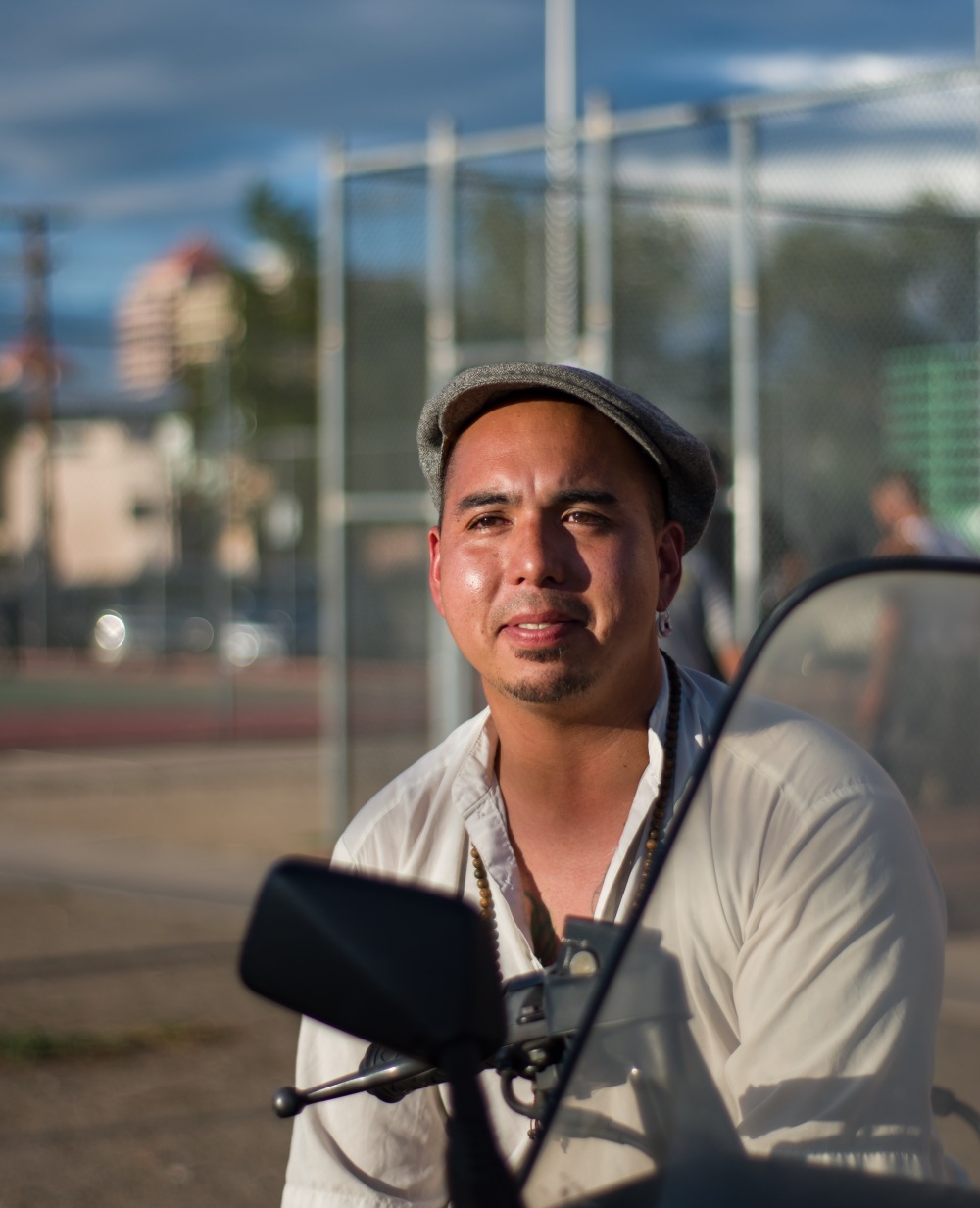“If I had to describe myself I would say I am a “Blessedtizo.” As a mixed person, we are blessed. We get to walk in multiple worlds. Ultimately we grow to respect and love culture.” – Henry Jake Foreman
My name is Henry Jake Foreman. I’m Absentee Shawnee from Oklahoma as well as Filipino and Scott-Irish. Soy de Burque, hijo de mais, planting seeds of consciousness on the land like a weed. I grew born and raised in Albuquerque, New Mexico. I spent a lot of time in these hand ball courts [Barelas neighborhood] in high school while I went to Albuquerque High. I learned so many values in the handball courts. I learned how to be a competitor. I learned how to play fair, I learned about respect. Most importantly, I learned about the history of Albuquerque and how there is so much beauty around us in these historic neighborhoods, pueblos, and communities. I love New Mexico! I love to represent it! I love to educate as many people as possible by connecting critical theory and practice.

Being Burqueño
Growing up in Albuquerque was rough, rugged, and beautiful all at the same time. I was in a band with a couple of my homies and I played trombone as well as swang. I was a ska kid growing up and there wasn’t many ska kids growing up. I also listened to Hip-Hop and Punk Rock, but I really found my voice through performance and being on stage. I saw that there was so much talent in these high schools; as graffiti writers, as rappers, and creative stylistic people. That’s why I loved growing up in Albuquerque… there is so much cultura! As Albino [La Plazita Institute] says, “La cultura cura.” I really believe that. I’ve had a lot of amazing mentors in my life, especially at UNM doing service learning and working with different programs. I worked in Martinez town for 5 years and working at UNM with other college students to do service based work. Ultimately as a planner in Community Regional Planning, I learned a lot about this idea that process must incorporate the Indigenous world view. For me, that’s when my Indigenization happened. To understand the essence of Indigenous scholarship is that scholarship is the Indigenous self. That was gifted to me by my mentor Ted Jojola. He got me into this idea that as planners, especially as educators, as Indigenous planners we have always done multigenerational planning. In Chaco Canyon it took up to 7 generations to build what they built. So this idea of long term planning, this idea of educating people, and this idea of intergenerational engagement has always been a part of my culture. I do that with my own type of engagement and education at the Native American Community Academy (NACA). I was senior capstone teacher for the past 2 years and now I work as their Substance Abuse Prevention Office, a.k.a. SAPO. It’s been awesome to work with the kids around suicide, alcohol, and drug prevention. I am really grateful for that opportunity for what I have been able to do at NACA and working with youth.
If I had to describe myself I would say I am a “Blessedtizo.” One hundred percent I am a blessedtizo. As a mixed person, we are blessed. We get to walk in multiple worlds. We get to be with multiple different people. Ultimately we grow to respect and love culture. As a mixed person, I was always searching for my own culture. I was so many different ones that I didn’t know what culture to choose. Growing up in Burque, a lot of my friends where Mexicanos, so I was able to understand that identity of la “Raza Cosmica.” That really spoke to me, growing up with no people around like me, with no family. In college I got to better understand my Indigenous identity. My Shawnee identity. My Filipino Indigenous identity. Ceremonies like this [points at tattoos], represent very important moments in our lives. It represents different kinds of levels of being. I got to understand all of these things by traveling around the world, but it was nothing compared to the journey that I went within.
Growing up in Albuquerque I looked up to the hustlers. I looked up to the drug dealers. I looked up to the kids who would drive up in $30,000 cars. And I would be like, ‘how do I get to do that?’ I saw a lot of violence in high school. I saw a lot of things that I wished I didn’t. Every single year of high school, I know of at least one student that got murdered. Growing up, I thought that was normal until I went to UNM and I saw other people didn’t have to live like that. Other people’s high school experiences wasn’t like that. So why was my high school experience like that? And that’s when that critical theory comes in and helps you understand those histories; historical trauma. Those histories of environmental racism and you get to articulate it more through praxis. Praxis is this idea of understanding epistemology, the idea of how we come to know. For me, I came to understand that there is more than one worldview, we don’t just have to go into the dominant worldview, the dominant culture; we can subvert it. And the best way to do it is through soft culture. Through what we dress, through what we ride, through how we speak to one another. I think that soft culture is the power that we have been blessed with. Especially as mixed people, going back to this notion of “blessedtizos.” We are blessed with this culture so we need to use it as our tool, as a weapon, in the 21st century. And do it as cool as possible to get those other young kids to look up to hopefully someone like me or other people. To show that they are unique and they are being themselves, and they are getting stuff done.

Poison into Medicine
The theme of turning poison into medicine has been a part of my life. My Dad was an alcoholic and I was going down that same path myself until he passed away from cirrhosis of the liver. When he passed away that’s when I started to get a critical understanding of asking myself, ‘why was my Dad an alcoholic? Why was his father an alcoholic?’ And I could trace it back through history; the history of colonization. And I could understand that I was going down that same path. But I chose to do something different. I chose to heal. I chose to stop drinking and I chose to get into my passions; bicycling, gardening, and art. And that transformed my life. And I needed to share it. I had a responsibility as an Indigenous person, to share it with as many people as possible. And that’s how I got involved with NACA. Being a teacher, taking kids on bike rides, having kids learn about their own culture. And learning about things that I only learned about until graduate school; praxis- connecting theory to practice. This idea that Indigenous languages are important because they are dynamic. They illustrate the inner dynamic of all things, instead of separating things like we do in academia today. NACA is all about holistic wellness and Indigenous education. I am blessed to be teaching there, because everyone there believes that education is a form of sovereignty. Education is a form of transformation. Education is revolutionary. And we get to do it every single day, to connect our culture and put into practice. We encourage young people to be their best selves. To be healthy, to be happy. To not do drugs and alcohol. Ultimately, we want them to connect back to their culture because a lot of us are disconnected.
The Karina Colectiva derived over 7 years from the understanding that for me to do my job well, I need a community. I need a collective. And I need a compassionate collective. A lot of the times, this type of work doesn’t pay too well. A lot of times it is done through love and service. Through our own hearts. I wanted to create a collective of people who felt the same way I did that can work together well and that could make an impact by creating events, products, educational activities. That’s how the Karina Colectiva came into fruition. For me, the Karina Colectiva a youth cooperative. Where youth can learn about cooperative economics. How to work amongst each other without exchanging money, but rather exchanging time and energy. And ultimately being able to learn and earn. To solve that root cause issue of poverty. We see it across the state. I am trying to figure out how I can get these students working and doing something they love.

Future of NM
What makes Albuquerque and New Mexico so unique is the history, the landscape, the deep sacredness. The sacredness is still here, I still feel it. I feel it here in Barelas. I still feel the bosque. I still feel the Rio Grande. I wish that is something that I wish more people could connect to. The nature and the natural history that we have in the state. Also, I feel like I belong here. Because where else would I fit in? A lot of us are misfits here. A lot of us are searching for something. There’s a lot of deep people here. There is a deep spiritual foundation here from all walks of life. From different nationalities and all places around the world. There is a lot of spirituality here and that is something that we need to embrace more as Humans of New Mexico.
The issues that I see in New Mexico are really broad. We have a lot of issues, but we also have a lot of strengths. For me, the most important issues is water. If you go to anywhere outside of New Mexico, you realize how dry it is out here. This is a desert and we have a finite amount of water. I think of water as being a crucial component of our future existence here. It’s something we should really take seriously. It’s something that we need to put more time and energy into thinking of how we are going to solve this issue. Before my lifetime ends, we are going to see issues around water. I also see a lot of health issues; preventable health challenges that we can easily fix by getting active, by playing handball, by riding your bike, by eating those organic foods and vegetables. We have so much agricultural heritage here, and we need to embrace that too. I am really passionate about farming. I am really passionate about hemp, that is something that I really want to go deeper into because I think that could be an industry that young people could start getting into. That we can start creating our own things. Most importantly, understand how we are going to take care of ourselves. I doubt anybody outside of New Mexico is giving New Mexico much thought; other than gas, petroleum, and fracking. And we don’t want that!
An idea I learned in college was liberation technologies. Technologies that harness the natural renewal qualities of life. To decrease our dependencies on oil and gas. It’s kind of hypocritical of me while on top of my scooter. But this scooter gets 93 miles to the gallon. This scooter can be converted using hydrogen gas. The technologies are here, we just have to do it. That’s really my passion, being able to create solutions using simple technologies that we can share with our brothers and sisters around the world. Asking ourselves how we can start generating our own energy. How can we start using technology to build a movement? Those passions of gardening, riding, and doing art always come back to everything that I do because we need to harmonize the artistic side with the spiritual side and the scientific side. And that’s the foundation of a peaceful society, people who honor art and spirituality. People who honor each other. That’s what I do every day, and I do it with a smile, and I try to inspire others to do the same. At the end of the day, all we have is our voice. All we have is our connection to each other. And that’s enough.

TedX
Style is important! Style is what gets the young people involved. Style is what makes a statement. Anything that we do we have to make a statement. I get a lot of inspiration from the east and from my Indigenous side and how I bridge that. I was born and raised Buddhist. For me the hippest thing right now is Buddhist Monks. How can I learn from them and bring that into the 21st century? I call it “Dharma Futurism wear.” That is the style we are creating, but at the end of the day anyone can create their own style. The same clothing that I am wearing today is the same clothing that I was wearing in high school- Dickies, PF Flyers, and white t-shirt. That was something that I wore every single day. That’s something that is still cool, and I like to understand that history to understand where this uniform came from. It came from the streets and it came from prison. This is a sport (handball) that helped people out in prison, it’s a therapy, and so there is value in it. I want to be able to bring that out to my style and my fashion to understand that deeper history.
TedX took the world by storm! There is so many ideas and it is a good way to understand performance art. I was honored to be asked to be a part of TedX and it made me think what I wanted to convey and what my message should be. I’ve come to understand that my message is that we all can connect back to our Indigenous roots. Some might have to go a bit farther than others, but we all have Indigenous roots. And we can use those Indigenous roots to inform our future by incorporating those roots and those worldviews and those ways of knowing into the 21st century. By using processes that our ancestors used, there’s numbers, there’s elements, that we can incorporate back into our life to help us organize our thoughts. To help us better speak to one another. To help us make money if we want. To help us make an impact in our communities. Indigenous ways of knowing and Indigenous research methodologies is the future. And that’s what I want to share in TedX! This is the coolest thing you could be doing right now and it’s coming out of Burque! It’s coming out of UNM! It’s coming out of our ancestors here in New Mexico! We have a wealth of knowledge, creativity, history, and culture. And that’s just what I want to illustrate in my TedX talk.
I want to encourage everyone to think of their own personal health, to think about their cycles in their lives. The cycles of birth, aging, and death. Ultimately those cycles connect us back to the earth and to each other. They make us understand that nothing is finite. That everything changes, and that every turn of the wheel is a revolution.

